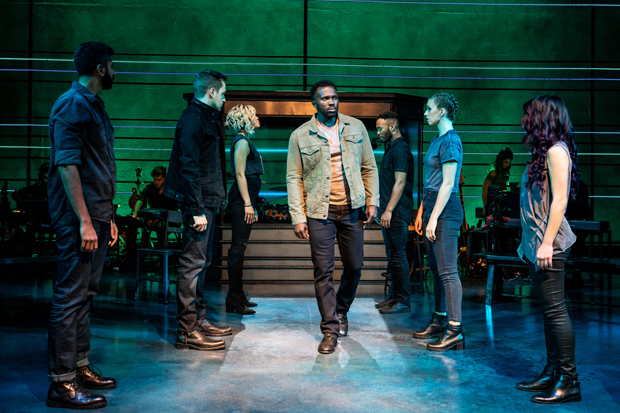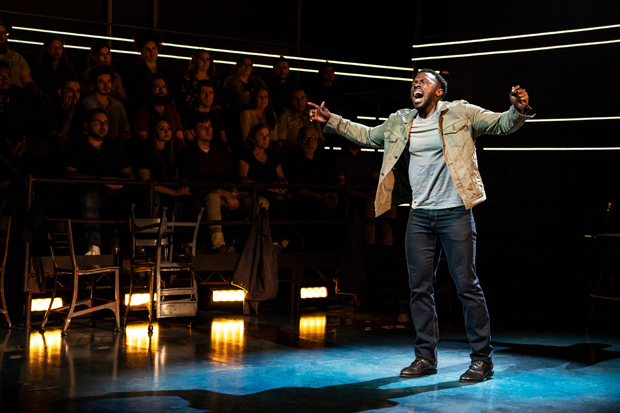Joshua Henry Shows Us Why He's the Right Guy for The Wrong Man
From ”In the Heights” and ”Hamilton” to building bridges with audience members, Henry is a class act all the way.

(© Matthew Murphy)
Aaron Burr and Billy Bigelow helped Joshua Henry prepare for the stamina and vocal stylings required for The Wrong Man, Ross Golan's concept-album musical about the wrongly accused Duran who is caught in the complexities of the criminal justice system. During the 90-minute nonstop vocal show, which runs through November 24 at MCC Theater, Henry barely leaves the stage, belting song after song, each seemingly more emotive and powerful than the last.
"Hamilton and Carousel really helped me to understand what that feels like," he said. "Billy Bigelow for the stamina and Aaron Burr for the style. I've loved pop music for a long time, and this type of music is right up my physical alley."
Golan has written some of the biggest hits of the last decade, from Ariana Grande's "Dangerous Woman" to Flo Rida's "My House," and Henry is excited to be digging into the pop genre onstage. He first heard the music when he was on vacation from his run in Hamilton, and director Tommy Kail sent him rough demos of the album. He immediately knew he had to be a part of it.
"Whenever Tommy or Alex Lacamoire send me something — whether it's for something potentially that can move forward or just like check this out — I know it's gonna be good," Henry said. "I fell in love with the melodies and the story of the concept album. And I called him back and I was like, 'Tommy, this is amazing.'"

(© Matthew Murphy)
This interview has been condensed and edited for clarity.
You've been collaborating with Tommy Kail and Alex Lacamoire for years, from In the Heights to Hamilton. How did this project grow out of your work together?
We've worked together for many times over the years. We did The Wiz in 2009, and then we also did In the Heights. That was my first Broadway show. Our history goes back to 2006, so we're 13 years in now. They happen to be the best at what they do but we're friends and that feels really cool. I knew them before the first musical blew the world up, and I just respect and admire their work so much. I feel like they're always on the cutting edge of what musical theater can be, and I want to be on those front lines too hitting that gas.
This show tackles the American criminal justice system head-on, and it feels incredibly relevant to conversations that are happening in our country today. How does it feel to be performing this story with what's going on in the world?
The first musical that I led was The Scottsboro Boys, and doing that show at an early age fortified the importance of doing art with a purpose. Not every job that you get is going to be changing the world or telling a very relevant story, but here we are in 2019 with the same kind of subject matter as The Scottsboro Boys. We're finding out more and more every day that people have been locked up for a very long time without just cause. It's great to perform something that is having a big part in the conversation about issues that are happening right now. That's why I wanted to be involved with it. I want to do art, yes. I want to make a living. But I want to do things with what I feel like is a purpose. The Wrong Man is a big umbrella for all of those things for me right now.
Do you relate to your character Duran?
Singing the song "Stay Positive" really makes me think. He's singing about a really crazy situation, but as a performer, there are moments when things aren't progressing the way that you want them to. You only have what you can control, and I can relate to that feeling. You just have a dream, and it's not quite there yet. I've been supremely blessed in my career, but I have other high goals for myself. Sometimes you feel like you're holding on by a thread. That's what that song means to me.
There was a moment a few weeks ago when you took a cellphone from someone in the audience who was filming. Since then, you've spoken about how this incident opened up an important discussion about engaging different audiences in the arts. Why do you think it's important to keep having these conversations?
This show is connecting people who sometimes go to the theater and also this audience that comes from the concert world, and the rules are very different. It's important for people in theater to try to not come across as elitist. That brings division. What is going to bring unity is saying, "Hey we want you here. Here's why this behavior is important here." That's why when that incident happened, I called that guy. First of all, he apologized, and that really touched me to want to go a step a further and understand why he did what he did. It wasn't right.
The conversation could have been like: Josh did this with a cellphone and then that's it. How am I growing from this? The conversation that we had face-to-face and then over the phone grew into something much more. I actually apologized to the dude. We had a thing about connection and forgiveness and taking accountability and why we behave a certain way in the theater. We really connected and that helped. He's going to want to see more shows because of that.
We don't want to be isolated. I forgot the great director who said this, but the future of musical theater is in how we open it up. We have to keep telling different stories, but we have to keep inviting new audiences. I think that's really important. We've got to talk more.








